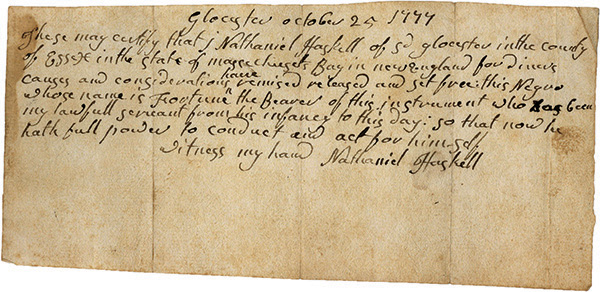Promises and Limits of the New Republic
Saturday, February 29
1:00 p.m.
A panel discussion and conversation exploring the concept of freedom in post-revolutionary America, followed by optional teacher professional development workshop

Promises and Limits of the New Republic: A Closer Look at African Americans on Cape Ann features scholars Joanne Pope Melish, Associate Professor of History Emerita at the University of Kentucky and author of Disowning Slavery: Gradual Emancipation and “Race” in New England, 1780–1860; Kabria Baumgartner, Professor of History at the University of New Hampshire, Durham and author of In Pursuit of Knowledge: Black Women and Educational Activism in Antebellum America; and Lise Breen, local historian and researcher on the history of slavery on Cape Ann. Bethany Jay, Associate Professor of History at Salem State University and co-editor of Understanding and Teaching American Slavery will moderate the discussion, addressing the broad context of freedom and race in the northern states after the American Revolution, with a lens on Essex County and Cape Ann.
Free and open to the public. Space is limited, reservations required. Reserve online at Eventbrite or call (978)283-0455 x10.
Following the panel discussion, K–12 public and private school teachers are invited to join in a professional development workshop examining related primary source materials that can be used to enhance their classroom curriculum. This workshop will be facilitated by Beth Beringer, Essex Heritage Director of Education Programs. Participants have the opportunity to earn professional development points (PDPs) by creating a lesson/activity plan based on the workshop. Teachers should register separately for this session.
The Professional Development Workshop runs from 3:00 to 4:00 p.m. and is free for educators. Space is limited, reservations required. Reserve online at Eventbrite or call (978)283-0455 x10.
This program is the third in a series offered in conjunction with the special exhibition Our Souls are by Nature Equal to Yours: The Legacy of Judith Sargent Murray on display at the Cape Ann Museum through March 2020. Judith Sargent Murray was an advocate for women’s rights at a time when few women were making public their desire for equality. The special exhibition has invited us to take a closer look at life in 18th century America by exploring aspects that are often overlooked in history including women's role in society; educational and economic opportunities for women during the same period; and issues related to gender and race inequality, past and present. This program was made possible through a partnership with the Terra Foundation and the Sargent House Museum. Additional funding was received from Mass Humanities under their special initiative The Vote. Mass Humanities is supported by the Massachusetts Cultural Council and is an affiliate of the National Endowment for the Humanities.

About the Panelists:
Kabria Baumgartner teaches early African American culture and literature at the University of New Hampshire Durham. Her book, In Pursuit of Knowledge: Black Women and Educational Activism in Antebellum America (New York University Press, 2019), tells the story of African American girls and women who fought to desegregate public and private schools in the nineteenth-century Northeast. She has earned awards to support her work, including fellowships from the Massachusetts Historical Society and Phillips Library. Her writing has appeared in the Journal of Social History, the New England Quarterly, and Historic New England magazine. She grew up in Los Angeles, CA, and now lives with her family in Newburyport, MA.
Lise Breen has been researching the history of slavery, the slave trade and the response to the abolition movement on Cape Ann for several years. She has given many public talks on various aspects of this history, both locally and regionally. Her most recent essay, “Inculcated Forgetfulness at a Northern Port,” on Frederick Douglass’ 1865 admonishment to Cape Ann merchants and shippers, was published by the African American Intellectual History Society blog, Black Perspectives. Among other support, Lise received the Paul Cuffe Memorial Fellowship at the Munson Institute (Mystic Seaport Museum), a Phillips Library Fellowship (Peabody Essex Museum), and she attended the Gilder Lehrman Center for the Study of Slavery, Resistance, and Abolition Summer Public History Institute (Yale University).
Bethany Jay is an Associate Professor of History at Salem State University, where she works in a number of fields including nineteenth-century American history, African-American history, public history, and history education. She is particularly interested in the presentation of slavery in museums and has worked on several projects related to that topic. Along with Cynthia Lyerly, Bethany Jay co-edited Understanding and Teaching American Slavery, which won the American Historical Association's 2018 James Harvey Robinson Prize for "the teaching aid that has made the most outstanding contribution to the teaching and learning of history in any field for public or educational purposes." She is also a member of the Advisory Board for Teaching Tolerance's Teaching Hard History: American Slavery project and was one of the authors of the project's "A Framework for Teaching American Slavery."
Joanne Pope Melish is Associate Professor of History Emerita at the University of Kentucky, where she also directed the American Studies Program for several years. Dr. Melish received her Ph.D. in American Civilization from Brown University. Her research focuses on slavery, emancipation, and the development of racial ideologies in the northern colonies and states. She is the author of Disowning Slavery: Gradual Emancipation and “Race” in New England, 1780-1860 (Cornell University Press, 1998) and several essays on pre-Civil-War race and slavery and on interpreting slavery in public history and pedagogy. Currently she is a Visiting Scholar in the American Studies Department at Brown University.